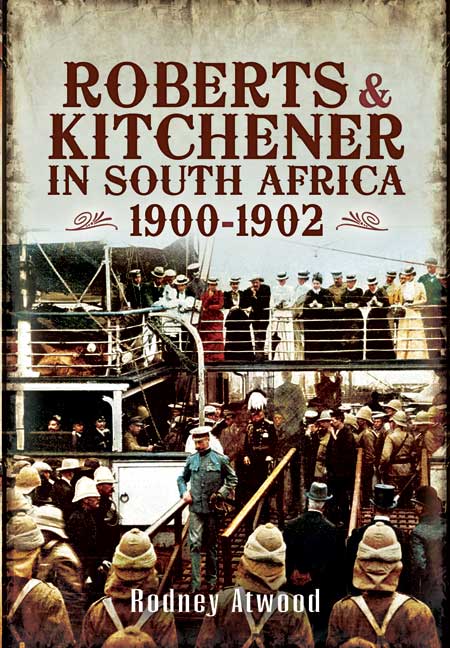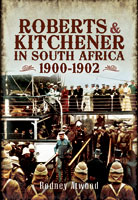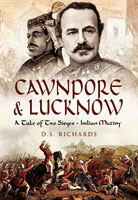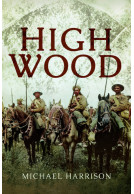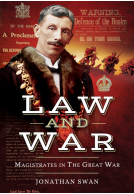Roberts and Kitchener in South Africa (ePub)
1900-1902
Imprint: Pen & Sword Military
File Size: 9.9 MB (.epub)
Pages: 272
ISBN: 9781844685646
Published: 16th November 2011
| Other formats available - Buy the Hardback and get the eBook for free! | Price |
|---|---|
| Roberts and Kitchener in South… Hardback Add to Basket | £25.00 |
The British Army was shocked by three military defeats in a week in South Africa in late 1899. The commanding General Sir Redvers Buller lost his nerve. 'Something must be done' was the cry across the Empire. Britain sent forth not one, but two military heroes. Field Marshal Lord Roberts and Major General Lord Kitchener spent their first five weeks in South Africa restoring morale, reorganising their forces and deceiving the enemy as to their intentions. In the next four weeks their offensive transformed the war: Kimberley and Ladysmith were relieved from Boer sieges and an enemy force of 4000 under General Cronje was captured on the Modder River. A long and bitter guerrilla war ensured in a terrain ideally suited to fast-moving Boer commandoes. On the dark side, deeds were committed of which no civilised empire priding itself on justice and fair play could be proud. The comradeship-in-arms of Roberts and Kitchener, their differing yet complementary personalities, their strategic and tactical decisions are described and assessed using a wide variety of sources including, personal papers and official correspondence. By these men's resourcefulness the British Army, despite its unpreparedness and poor leadership at many levels, won a remarkable victory in the first of the twentieth century 'People's Wars'.
Atwood's astute and meticulous account is a valuable guide to a pivotal three years in the history of two nations.
Society for Army Historical Research
Atwood’s account of the Boer War, seen from the viewpoint of a high command that struggled with an inadequate general staff structure, serial incompetence in the field at officer level and disastrously bad intelligence, is comprehensive, detailed and sympathetic. He is excellent on the rival networks of protégés and place-men built up by Wosleley, Roberts (whom Wosleley derides as a ‘scheming little Hindoo’) and Kitchener, ring versus ring, maintained by a diligent working of aristocratic and/or politically-connected admirers and outright media manipulation. Similarly, he conveys the urgency of the modernisers trying to shake off the hidebound military legacy of the early Victorian era. Roberts’ preferment of Kitchener, even with the latter’s recent success in Sudan, led to resentment as the hero of Omdurman and Fashoda was but 41st in seniority—and those above him expected their due, irrespective of age, fitness, experience or ability.
Fergus Nicoll
This is probably the finest account yet available of Britain's first 'modern' counterinsurgency.
David Benest
The Boer War in South Africa marked a turning point for the British Empire, nut this is not he tale of that campaign, rather the two men - Fd Marshal Roberts and Gen Kitchener - who were parachuted in to save the day after initial setbacks. There are interesting parallels to the Iraq invasion of 2003; an initial series of victories which came quicker than expected, the conflict declared pretty much over and then several years of guerilla warfare. For an insight into Victorian-style counter-insurgency this book is well worth a read.
Soldier magazine
Drawing on a good grasp of the relevant manuscript sources, this is an impressive and well-documented account of the Boer War that focuses on the role of Roberts and Kitchener in righting the disasters of the early stages of the conflict and then ensuring the conquest of the Orange Free State and the Transvaal. Deals subsequently with the response to Boer guerrilla tactics. A well-informed work that deserves a wide readership.
Historical Association
This excellent history is not quite so restricted in time and geography as the title suggests and, whilst covering some of the battles in detail, is generally more concerned with presenting the interactions of U.K. and S. African politicians, the military, and the burghers.
David Page, The Kipling Journal, March 2012
The first three chapters describe Kitchener's activities in Egypt and the Sudan, including his battles with the Mahdists at Atbara and Omdurman. This proves very helpful in understanding the intial short-comings of the British army in the South African war.
Roberts, after leaving India in 1893, had been kicking his heels in Ireland for much of this time. Dr Atwood describes events in South Africa during 1898-9, until Roberts was appointed to Commander-in-Chief of the army there in December, 1899. Kitchener, with his own agreement, was appointed to be Robert's Chief of Staff since there was some concern that Roberts might be too old to carry the load alone.
Chapters 6 to 11 are now devoted to the events of 1900 during which time Roberts holds centre stage. By the end of that year it looked as though the war was almost over, and Roberts returned home leaving Kitchener as the C-in-C to finish the task.
The last section of the book deals with Kitchener's difficulties in overcoming the bittereinders during 1901-02 using various methods including the infamous 'concentration camps', and keeping the politicians back in the UK satisfied. Dr Atwood also explains how the role of the 'blockhouse' was for more than just guarding the line. The final winding up of the war with the reasons why the Boers agreed to submit is very clearly set out. The wisdom of Kitchener in not pressing for is unconditional surrender (in opposition to the wishes of Milner and the Uitlanders) is shown very clearly, as are the resulting benefits received by Britain 12 years later during WWI and WWII when South Africa fought alongside u.
One again the maps drawn by Dr Atwood's daughter are very helpful in explaining what is happening, whilst the Notes and Bibliography are a resource that anyone writing about S. Africa in the future should consult. I have learnt a great deal from this book and am delighted to have it on my bookshelves.
The British Army was shocked by three military defeats in a week in South Africa in late 1899. The commanding General Sir Redvers Buller lost his nerve. ‘Something must be done’ was the cry across the Empire. Britain sent forth not one, but two military heroes. Field Marshal Lord Roberts and Major General Lord Kitchener spent their first five weeks in South Africa restoring morale, reorganising their forces and deceiving the enemy as to their intentions. In the next four weeks their offensive transformed the war: Kimberley and Ladysmith were relieved from Boer sieges and an enemy force of 4000 under General Cronje was captured on the Modder River. A long and bitter guerrilla war ensured in a terrain ideally suited to fast-moving Boer commandoes. On the dark side, deeds were committed of which no civilised empire priding itself on justice and fair play could be proud. The comradeship-in-arms of Roberts and Kitchener, their differing yet complementary personalities, their strategic and tactical decisions are described and assessed using a wide variety of sources including, personal papers and official correspondence. By these men’s resourcefulness the British Army, despite its unpreparedness and poor leadership at many levels, won a remarkable victory in the first of the twentieth century ‘People’s Wars’.
Books Monthly
About Rodney Atwood
Rodney Atwood BA PhD is a graduate of the McMaster University, Canada and Churchill College, Cambridge. He served in the Royal Tank Regiment before pursuing an academic career. While this is his first book with Pen and Sword, he is a published author. He is also a regular contributor to historical journals and a frequent lecturer.







